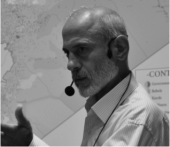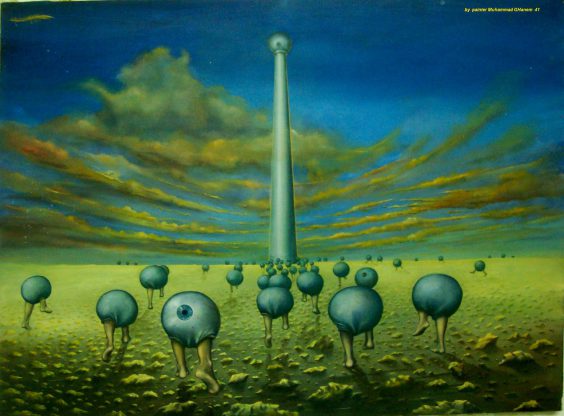The Graveyard Conversation
by Mohammad Habeeb translated by Amani Attia / December 15, 2016 / No comments
He always wondered at the loud laughter he heard every time he walked by the graveyard at night or during the quieter hours of the day. Every time he heard it, he would tell himself that the next day he would have enough time to investigate the noise. Days, even years passed, and he had not been inside the graveyard to get to the bottom of those chuckles that sounded the same every time he heard them. Today, as he stood at the window of the new house, he discovered that what he had taken to be a high walled garden was a spectacular graveyard, even more spectacular than the gardens in his homeland. The tombs were aligned geometrically as in a landscaped park. Even the stone benches under the big trees on the sides looked more like garden benches. The walkways between each group of tombs made that graveyard, to some extent, a good place for a picnic.

- Mohammad Habeeb is one of the most prominent translators from Syria. Habeeb has translated works by T.S. Eliot, José Saramago, James Kelman, Sindiwe Magona, Erich Fromm, Moris Farhi, Carl Gustave Jung, Erich Fromm and others into Arabic. He is also a poet and writer. In the wake of the Arab spring in 2011, Habeeb co-founded and was a leading member of Maan (Together), a peaceful movement to accompany the Revolution in Syria, and support Syrians’ peaceful demands, 2011-2013. Habeeb automatically came under the Syrian regime’s watch list, due to being held by Assad as a prisoner of conscience for 9 years for distributing an informational flier, his continued critical writings and his calls for a peaceful change in the country. His family was constantly harassed and living under threat from government soldiers, IS and other militias. Mohammad Habeeb and his family arrived in Stavanger City of Refuge in August 2015, where he is the current ICORN writer-in-residence.
Like a hypnotized person, he slowly turned away from the window, put on his shoes, and went out. When he got to the tenth rung of the stairs, and just as he was about to step onto the sidewalk, he remembered his cigarettes and went back for them, only to end up in front of the stove making coffee to take to the graveyard and enjoy drinking on one of those benches.
He stood on the sidewalk by the pedestrian walkway, his cigarettes in his pocket, and his coffee cup in his left hand; he needed his right hand to open the iron gate to the graveyard. Looking intently in the direction of a passing bus as he was about to cross–a well-known communication signal meaning I will cross when the driver stops–he was surprised that the bus driver, who had looked to the left and to the right, did not seem to have seen him.
After the bus had passed, he crossed the street wondering why the bus driver ignored his attempt to signal him. He got to the graveyard gate, opened it and went in. There were visitors inside, all elderly, paying respects to their loved ones resting there in peace, and placing flowers on their tombs that were hardly noticeable but for the tombstones. The graveyard was organized into rectangular and square bays, each containing a number of tombs, identical but for the granite tombstones. It seemed tombstones were a lucrative trade; they stood in different shapes lengths and thicknesses, reflecting the financial status of the families of the deceased.
He walked among the tombs, and then sat under a big tree situated near the middle of the eastern fence to the graveyard. He lit a cigarette, inhaling deeply, then took a sip of the coffee. He watched the visitors gently placing the flowers on the tombs. A number of them had little axes to dig a hole in the pebbles that covered the ground uniformly, planting the flowers in the hole, and hoping they would stay fresh till they replaced them the next week.
Once again, he heard the same loud laughter, though he had never thought about that. At first, he thought he was dreaming, and felt scared! Was he here, in the furthest north, or was it all a dream and the bustle of the laughter was the end of the dream? He turned and there were no drunk people around, and no children at play, only the visitors moving gently and respectfully like they had not heard the loud laughter. He stood up and listened carefully, trying to locate where the laughter was coming from. Then he walked towards the western side of the graveyard where the biggest trees were. Strangely, he was very composed and not at all agitated by his curiosity. The laughter became louder as he got closer to the spot.
When he reached the western side, he saw them sitting on the walkway between two bays. Grey shadows, of different age groups though more like carbon copies of each other in size and features. He did not panic, nor was he paralyzed by shock. He stood looking at them, so detachedly he surprised himself. It seemed like they had not noticed his presence as they were busy listening to one of them that had just joined them in the graveyard; he was the oldest of them all. After a long laughing spasm, that ghost resumed talking: “What kind of question is that your idiot? Of course the worms have already ravished me; how could I have joined you otherwise? You know? I wish the worms’ teeth were stronger so they could be done eating me up quickly. I even suggested they go sharpen their teeth and come back to finish the job. You can’t imagine how they responded to that. Those bastard worms said that the problem was not the teeth; it was rather my tough flesh!”
The youngest amongst them asked: “And who was right? You or the worms?”
They all laughed again, while the older shadow was taken back by the question.
He said, “I think those worms were pretty young, they couldn’t handle devouring eighty years’ experience while eating human flesh.”
Then he turned to one of them and said: “You, righteous man! Do you remember how I gulped you up in just one bite?”
“I remember that a sales employee in the firm ate me, but I didn’t know it was you. I am sure you would remember though. I couldn’t see who it was because whoever it was started devouring me from the back.”
“That’s true. I had to start eating you from behind. It would have been difficult to overpower you if we were face to face.”
They all laughed again. Strange how they just laughed at everything, even sad stories that should have made them cry.
Then the youngest among them said, “So maybe it was you who ate my father too?”
The eighty-year old ghost laughed viciously, then peered in the shadowy face that asked him the question, saying, “I have devoured the flesh of many. Maybe if you give me your father’s name I would be able to tell you if he was one of my delicacies.”
The younger ghost replied, “My father was the Vice Chairman of the Chamber of Industry.”
Again the old ghost villainously laughed for an even longer time, interrupting his laugh only to look at the younger ghost and ask him: “Seriously? You are the Vice Chairman of the Chamber of Industry’s son?”
The young shadow nodded, confirming that he was indeed the son. When finally the villainous laughter subsided, and everyone else’s as well, the older ghost said: “Yes, I did take part in devouring your father; he was eaten up in stages by more than one of us.”
“How so?”
“Seriously, the first to eat of your father’s flesh was the Chairman of the Chamber of Industry, your brother-in-law who was a very close friend of mine. After he started eating your father, I had a disagreement with him about my share in the flesh of the Secretary of Industry. He was dissatisfied with the share I gave him, so I ended up eating him too; I ate him up first in case he considered devouring me. And so I got to consume your father.”
The young ghost laughed, and asked: “And what are you going to eat now?”
“Whatever you are eating of course!”
They all joined in the laughter like a choir: “We eat the wait.”
“So, there is enough for everyone?”
He was standing there open-mouthed, stunned and unable to believe what he had seen and heard!
“Is this really the case of the dead? They do not know hatred or motivation to a tribal or family’s revenge. They laugh at everything, and chat like close friends! Is this madness or a philosophy of another life we have to think of yet?”
He moved on a few steps forward. He was walking steadily. He could not guess how he could be so calm and steady-steps. He stopped where he thought they would be able to hear and see him, and then he said, “What do you drink when you are thirsty?”
They all answered, just like a choir, without even looking at him: “Nice try! but we don’t allow by-standing ghosts into our conversations.”





